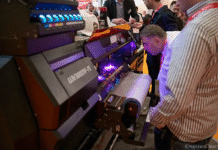The Hunkeler Innovationdays is a special show that highlights the various applications of digital presses when variable printing or short runs are married to inline and near finishing systems, delivering mostly intelligent documents as bound or inserted end products for distribution. These can be several types of print products from documents to books and packaging.
A leading example is high-volume direct mail or transactional documents that have been variably printed and then intelligently and securely collated for insertion in matching digitally addressed envelopes from large data streams. Similar data-based print and personalization technologies have also been used for the production of educational materials and securely personalized examination papers and marking systems in countries such as Turkey.
Another important application of variable printing is the automated and serial production of short-run books whose pages have been printed serially and then automatically folded, perforated, sheeted into signatures and assembled into book blocks for binding intelligently with their covers. These printed and bound books can be produced serially in a variety of format sizes and pagination with run lengths from one book to thousands – all at several levels of modular automation right from paper infeeds to robots putting the preprogrammed orders for books into shipping boxes.
At the Hunkeler Innovationdays in Lucerne, there are two exhibition halls that contain entire end-to-end applications being shown by the major web-fed digital press manufacturers together with their associated finishing processes with in-line automation. In some of the demonstrations the presses print from roll to roll and these are then moved over nearby to the appropriate finishing systems.
Two lessons learned so far
Most Indian commercial printers shy away from Hunkeler Innovationdays because they are not yet finding too many opportunities in leveraging variable digital print and data streaming. At the same time, short-run digital book production is garnering interest both from commercial trade book and government textbook publishers.
At Hunkeler there are many fully automated and modular solutions for in-line and near-line book production systems. Many of the applications shown with digital presses from Canon-Oce, HP, Kodak, Nipson, Ricoh, Screen and Xeikon at the show are book printing solutions, which after folding, perforation and block making on Hunkeler devices go into binding systems from the likes of Horizon, Muller Martini and Meccanotecnica.
Offline photobook layflat solutions are also shown at Hunkeler Innovationdays. Mailing solutions from Kern and Hohner and the former Pitney-Bowes are also generally prominent at Lucerne. A couple of packaging applications including security and track & trace are also on show.
Apart from seeing various interesting digital print applications from lotteries to books and direct mail, the digital printers from India who regularly visit innovationdays have at the very least appreciated two learnings: firstly, the possibilities of creating intelligent documents using variable data; and secondly, every intelligently and variably printed document contains unique printed marks that are machine readable and thus can be processed downstream with great individuality with high levels of automation.
In certain cases such as exam booklets, bank statements and pharma packaging, only high automation can provide the desired integrity and security required. In other applications like short-run book printing, modular automation can be configured to need-based levels. As one digital printer remarked recently, “Hunkeler is a place to quickly understand and anticipate several possible futures.”
















